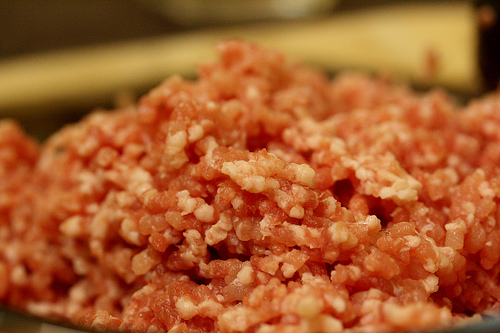A recent study by the Robert Koch Institute found that even small children in Germany eat raw meat more often than expected, so the Federal Institute for Risk Assessment (BfR) decided to remind Germans that raw meat for children is a bad idea.
"Raw animal foods are often contaminated with pathogens", explains Professor Dr. Dr. Andreas Hensel, president of BfR. "For this reason, especially vulnerable sections of the population, such as small children, pregnant women, the elderly and people with a weakened immune system, should as a rule not eat these foods raw."
Raw meat can transmit, among other things, salmonella, Campylo¬bacter, E. coli including EHEC, Yersinia, Listeria and also viruses and parasites.
A recent study by the Robert Koch Institute published in the Epidemiological Bulletin has shown that raw minced pork is the most important risk factor for contracting yersiniosis.  Yesiniosis is a gastro-intestinal disease which is notably caused by the bacterium Yersinia enterocolitica. Yersinia are predominantly spread through food, especially raw pork. Pork, for example minced pork and seasoned minced meat, is often eaten raw in Germany. One of the surprising findings of the published study was the high number of children who had eaten raw minced pork. Even of children who were one-year-old or younger it was reported that almost 30% of those who had fallen ill (and 4 % of the control persons) had eaten raw minced pork.
Yesiniosis is a gastro-intestinal disease which is notably caused by the bacterium Yersinia enterocolitica. Yersinia are predominantly spread through food, especially raw pork. Pork, for example minced pork and seasoned minced meat, is often eaten raw in Germany. One of the surprising findings of the published study was the high number of children who had eaten raw minced pork. Even of children who were one-year-old or younger it was reported that almost 30% of those who had fallen ill (and 4 % of the control persons) had eaten raw minced pork.
In Germany and other European countries, Campylobacter is now the most prevalent bacterial pathogen for enteric infections in humans. In the year 2011, more than 70,000 human campylobacteriosis cases were reported.
Campylobacter bacteria are notably found in raw or insufficiently heated poultry meat, but also in raw meat of other animals as well as raw milk and hen’s eggs.
The number of reported salmonellosis cases in humans, especially from Salmonella Enteritidis, has fallen significantly in the last three years.
In contrast, human infections with Salmonella Typhimurium have decreased to a lesser extent. SalmonellaTyphimurium are especially common in turkey meat and pork. As part of zoonosis monitoring, salmonella, most frequently Salmonella Typhimurium, were detected in 5 % of minced meat samples in 2009. This finding confirms that raw minced meat can be a source of infection for humans.
To protect themselves against often severe cases of foodborne infections, especially vulnerable sections of the population such as children under five, pregnant women, elderly and persons with a weakened immune system should as a matter of principle refrain from eating raw foods. They should therefore avoid consuming raw mince or seasoned minced meat, raw sausage, raw milk and raw-milk cheese, raw fish (e.g. sushi) and certain fishery products (e.g. smoked and gravad salmon) as well as raw seafood (e.g. raw oysters).
All that and no mention of raw sprouts? In Germany? The risk assessors did say consumers can “protect themselves by cooking meat and poultry sufficiently and evenly” and that .jpg) “such meat must be cooked until the juices run clear and the meat has a whitish (poultry), gray-pink (pork) or gray-brown (beef) color. The inside temperature of the meat should be at least 70 °C for two minutes. If in doubt, consumers can measure this temperature by means of a meat thermometer.”
“such meat must be cooked until the juices run clear and the meat has a whitish (poultry), gray-pink (pork) or gray-brown (beef) color. The inside temperature of the meat should be at least 70 °C for two minutes. If in doubt, consumers can measure this temperature by means of a meat thermometer.”
Some risk assessors. Color is a lousy indicator and consumers should be using a tip-sensitive digital thermometer to erase doubt. And stop making little kids barf.
